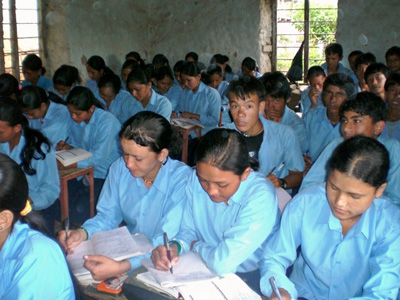Nepal's Maoist led coalition government has not been able to deliver its promises made in the campaign trail. The former rebels won 220 of the 601 seats in the April Constituent Assembly (CA) election and formed a coalition government in August of last year. The interim constitution mandates CA to draft a new constituent within two years starting from the first meeting on May 15, 2008 which voted overwhelmingly to end monarchial system and declare Nepal a federal democratic republic nation. With power shortage hitting as many as fourteen hours a day and small armed forces mushrooming in southern plains, Nepal-the newest republic-faces daunting challenges in days ahead.
Political infighting and finger pointing among major parties is complicating the Nepal's fluid transition phase. Sandwiched between two Asian giants, India and China, its unique location invites powerful influences. Delhi was infuriated when Prime Minister Prachanda was in Beijing to attend the Olympics closing ceremony breaking the age-old tradition of Nepal's Prime Ministers first visiting India once sworn in office. The frequent visits of high level Chinese delegation to Kathmandu in recent months have attracted Delhi's attention. While Delhi's "Big Brother" attitude has hardly changed, passive but attentive Beijing certainly wants a major role in Nepal's internal affairs. Additionally, the U.S. is a dominant power-broker and Beijing is aware that too much of American influence does not serve to its interest in the region.
Increasing political chaos is proving detrimental to Nepal's future. With more than 8 months into session, the CA has not even begun the process of crafting new constitution. Other than ousting the monarchial system, the assembly has been without agenda for all this time. Former rebel turned Prime Minister Pushpa Kamal Dahal, aka Prachanda, and his party are vocally criticizing parliamentary system and they hope to establish new model of government suited for the country. Yet, none of the political parties have come up with the new structure of federalism. The discussion on new constitution and the model of government is fading amidst political cynicism.
More than 80% of Nepalese live in villages with very little access to health, education and other modern amenities, and the situation has changed little. Lands seized by Maoists during the decade long war from 1996 to 2006 have not been returned to the owners. People have not felt the change they were promised. Nepal's political uncertainties coupled with lawlessness have proven a haven for looters, terrorists and black marketers. Strikes and vandalism are daily incidents in the capital city of Kathmandu. Frequent attacks on media outlets and journalists are mounting. Meanwhile, Terai region, also called the Madesh, has seen scores of minor rebel groups threatening and killing businessmen and civilians. Madheshi Janadhikar Forum (MJF)-the new regional political party based in southern Nepal-is demanding a separate Madhesi province to which others fear that it may result into partition of the country.
 A crowded classroom in a remote village in western Nepal.
A crowded classroom in a remote village in western Nepal.
Nepali Congress (NC), the opposition party is accusing PM Prachanda of marching towards totalitarianism and failing to abide by the peace agreement signed by seven major political parties in 2006 to end violence and usher into new era of peace and prosperity in the country. Even the coalition parties in government are not happy with PM's party. The Communist Party of Nepal (United Marxist-Leninist) and the MJF are threatening to walk out from the government. Maoists should work with them to end ongoing political turmoil. The United States, European Union and the neighboring countries are supportive of new government and they are closely watching Maoist activities. While Maoists are eager to present themselves as a credible political force, they should also practice what they preach. For this, Prachanda should be able to bring parties together in resolving differences and expedite the drafting of new constitution in the given time frame. He has to assure media houses and industries that are becoming new battlegrounds for political unionism and rampant vandalism that these activities would not be tolerated by the government. Moreover, donor agencies like World Bank, IMF and others should be able to feel a certain level of transparency in government funded programs. More than 40% people are living below poverty line and an immediate relief package is already due. Much hyped Maoist budget announced in September last year has not yet been executed.
With poor security and power outage choking remaining few industries the situation is dire. Some of the multinational companies are relocating their plants to India. Government has declared energy crisis and is proposing to build several thermal plants. But the measure is unlikely to solve the immediate need. People feel that their aspirations have once again been killed. The massive political change has not resulted change in attitudes of political parties and their leaders. The struggle for power in this tiny Himalayan kingdom turned republic nation continues and people's dreams remain in limbo.